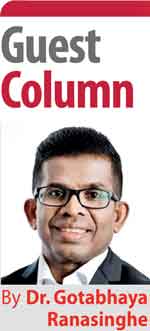Thursday Feb 19, 2026
Thursday Feb 19, 2026
Friday, 30 September 2022 00:00 - - {{hitsCtrl.values.hits}}

 It is no secret that the healthcare sector in Sri Lanka is being navigated with numerous challenges, especially after the COVID-19 pandemic and the recent economic crisis. The senior consultants and specialists have taken the reins into their hands, confronting and battling against emerging challenges acting as advisory and consulting professionals, managing increased patient loads, and conducting various programs that benefit the patients.
It is no secret that the healthcare sector in Sri Lanka is being navigated with numerous challenges, especially after the COVID-19 pandemic and the recent economic crisis. The senior consultants and specialists have taken the reins into their hands, confronting and battling against emerging challenges acting as advisory and consulting professionals, managing increased patient loads, and conducting various programs that benefit the patients.
Even during these challenging times, the Sri Lankan healthcare sector has witnessed widespread growth in terms of proficient specialist care that saved many lives by overcoming even the most adverse circumstances. It is almost every day that you hear about senior consultants conducting successful surgeries and treatments, ignoring the limited resources and minimal equipment. Though one would consider this a miracle or luck, these are results of the experience, commitment, skill, and expertise of the senior consultants.
The compulsory age of retirement announced - All senior consultants to retire at the age of 60
If the new amendment stays alive, by the end of this year (31/12/2022), more than 300 senior veterans in the healthcare industry will retire. This begs the question: Won't the compulsory retirement age of 60 deprive the country of specialist care?
It definitely will paralyse the health sector and create vacuum that will create a health crisis in the country.
Persuading healthcare professionals for early retirement is not a wise solution to overcome the dilemma of the economic crisis that we currently face. The officials need to address the issues within the system and dive deeper to resolve the foundational inefficiencies.
Let me ask you a simple question. Imagine you are aboard a sinking boat. What would you do? Push-off people to deep waters or fix the crack in the hull to keep the boat afloat? I anticipate that the Government will not accept short-sighted decisions but will take measures to “fix the hull” that will keep “the boat afloat”.
I strongly believe that imprudent proposals such as the early retirement of health care professionals if favoured are bound to drag the country to more dejected depths.
Sri Lanka doesn't have an excess of consultants!
It is witnessed that most of the skilled consultants are migrating due to the prevailing situation in the country. Doctors reading for post-graduate training prefer conducting their studies and continuing practice abroad. Even most of the young doctors presently employed in Sri Lanka are adamant about migrating in search of better prospects. With the young doctors gone and the senior consultants retired, who will fill the void of professional specialist care in the country? Where would the patients seek proper treatment?
How do senior healthcare professionals navigate through challenges?
With experience comes skill. With skill comes unique perspectives that enable us to manage challenges. With strategic management, the young doctors watch, train, and learn.
If the Sri Lankan health sector is left bare without senior consultants, who will lead and who will guide the young doctors?
Shouldn't we object to the early retirement age of 60 and revise the amendment to the age of 63?
Let me further elaborate on the immediate effects and the repercussions the health sector will experience if the senior consultants are to retire early.
1) Senior consultants are liable for efficient systems and skilful management while retaining a high level of patient care
2) Senior consultants are not hesitant to take on risks and accept challenges. With their exposure, they know quite well how to navigate through difficult times
3) Senior consultants have implemented numerous systems to safeguard patient rights by identifying areas where better treatment and services can be offered. They develop recommendations for further improvement
4) The training these senior consultants provide to young doctors is one of the major benefits
5) Senior consultants are also productivity specialists. They don't easily sway with pressure but stimulate workflow among the other members of staff by ensuring everyone is doing their part
The above factors unwaveringly validate why our healthcare system needs senior consultants.
Why are developed countries in favour of pushing back the age of retirement?
Many developed countries prefer pushing back the age of retirement as they adamantly believe that it protects and reinforces the social model.
With a more ageing population, increased life expectancy, and declining birth rates, a shrinking labour force is experienced. By extending the retirement age, national resources, output and income are boosted, strengthening social security.
Say no to early retirement!
As a practising General and Interventional Consultant Cardiologist presently executing my services at The National Hospital of Sri Lanka, I have first-hand experience of the efficiency that the hospital model is offered by senior consultants. I'm also aware of how a consultant-deprived health sector would drastically collapse, handicapping a nation as a whole.
The aforementioned issue needs to be addressed with urgent attention and delicate care by the relevant and responsible officials who are the only party that can prevent the country from being exposed to yet another perilous crisis.
Therefore, I humbly urge the Government to revise the retirement age of selected professionals employed under essential services to the age of 63 years.